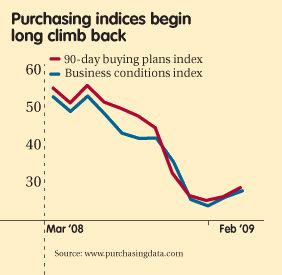On The Mend

Purchasing Magazine is taking a look at leading economic indicators. And as you can see by the chart above it looks like the worst is behind us. The upswing has not yet started but the rate of fall appears to be declining. The actual turn around is likely to be about six to nine months ahead. Baring further government interference in the economy of course.
While much of the data about the U.S. economy shows little cause for optimism, at least three leading economic indicators have trended up in the past two months, providing early signs that the economy may have hit bottom.Ah yes. Supply and demand are coming back into balance. Which is a very good thing.
Most notably, Purchasingdata.com’s Business Conditions Index has trended up for the past two months. The index, which is based on a broad survey of purchasing managers and procurement executives, hit a low of 23.9 in December but has since increased to 26.2 in January and 27.9 in February. As a diffusion index, the reading of 27.9 still indicates that business conditions are far from growing (growth is indicated when the index passes 50), but the trend is providing some possible indications that buyers think business is improving slightly.
Also of note, Purchasingdata.com's Buying Plans Index has also risen steadily since December from 25.3 to 28.7 in the latest survey this month. This indicates that buyers are planning to increase orders after a long decline in buying plans dating back to January 2008.
And what does our leading government expert on the economy have to say? Glad you asked.
This outlook for economic activity is subject to considerable uncertainty, and I believe that, overall, the downside risks probably outweigh those on the upside. One risk arises from the global nature of the slowdown, which could adversely affect U.S. exports and financial conditions to an even greater degree than currently expected. Another risk derives from the destructive power of the so-called adverse feedback loop, in which weakening economic and financial conditions become mutually reinforcing. To break the adverse feedback loop, it is essential that we continue to complement fiscal stimulus with strong government action to stabilize financial institutions and financial markets. If actions taken by the Administration, the Congress, and the Federal Reserve are successful in restoring some measure of financial stability--and only if that is the case, in my view--there is a reasonable prospect that the current recession will end in 2009 and that 2010 will be a year of recovery. If financial conditions improve, the economy will be increasingly supported by fiscal and monetary stimulus, the salutary effects of the steep decline in energy prices since last summer, and the better alignment of business inventories and final sales, as well as the increased availability of credit.And what does he mean exactly by fiscal and economic stimulus? He means the government is pumping in a lot of dollars into the economy in two ways. One by printing money and the other by taking money out of the real economy and giving it to companies favored by the government. The short version: government is strangling winners and backing losers. And the likely net result of all this stimulation? Inflation. And what is inflation really? A theft from our future. Lovely. Just lovely.
As per usual the losers in Congress have passed a stimulus bill about 6 months before the economy starts to seriously rebound. Trillions wasted for something that was bound to happen any way. Let your Government and especially your Congress Critter know how you feel about it.
House of Representatives
The Senate
The President
And if you would like to know more about economic indicators have a look at The Secrets of Economic Indicators.
Cross Posted at Classical Values













2 comments:
The pisser, of course, is that this recovery will be temporary.
The increased tax rates on top-bracket incomes and on capital gains will hit small businesses particularly hard (they are mostly LLC's and S-corps, which are taxed at individual income rates). In addition, capital-intensive businesses will be hit hard by the new energy restrictions, and capital-intensive industries tend to provide the best jobs at the highest wages. They are going to be exported to China and India even faster, soon.
Please note that these increased taxes are not scheduled to go into effect until the latter part of 2010, and will not have any ill effects until AFTER the 2010 elections are over.
yeah recovery just in time for the poser in chief to kill it dead with an f-n 3 pound sledge hammer.
Post a Comment